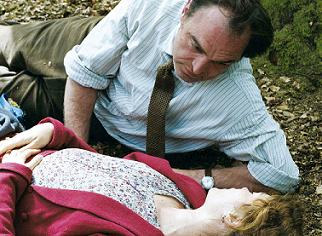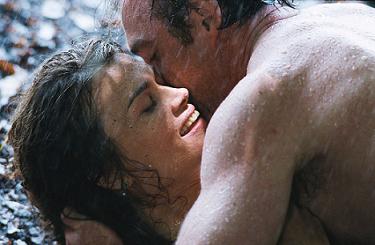Lady Chatterley


It's a bit strange watching a distinctly English novel within a French adaptation, but that is the case here, with Lady Chatterley, based on D.H. Lawrence's John Thomas and Lady Jane, the second "version" of his famous novel Lady Chatterley's Lover (most people are familiar with the third version). Even with its English pedigree, Lady Chatterley feels like a distinctly French film; the same one that critics fawn over and some people scratch their heads at. The French liked it so much that it won 5 Cesars (French Oscars) including ones for Best Film, Actress, Writing, and Cinematography, and was nominated in other categories including Best Director and Most Promising Actress. There are things to admire about director Pascale Ferran's (L'Age des Possibles, Coming to Terms with the Dead) lush adaptation, but at nearly three hours, the languid pace begins to wear on the viewer.
The basic plot is already familiar to most people, but for those who are in the dark about it, Ferran and co-writers Roger Bohbot (Itineraires, Kings and Queen) and Pierre Trividic (Dancing, Those Who Love Me Can Take the Train) leave most background information out, but most things can be inferred. Clifford (Hippolyte Giradot, Kings and Queen, Modigliani) and his wife Lady Chatterley (Marina Hinds, Tell No One, The Barbarian Invasions) live in the sprawling Wragby manor. Clifford is injured and uses a wheelchair to move about. Lady Chatterley is his nursemaid, but the work is getting too much for her. They hire a nursemaid for Clifford, leaving Chatterley with lots of time on her hands. The first part of Lady Chatterley is the weakest, only because nothing seems to happen for long stretches of time. Ferran wants the audience to soak in the ambience; the loneliness and isolation that Chatterley feels within the confines of Wragby, but his pacing is too languid.
The pacing stays the same, but the tone of the movie shifts once Chatterley begins spending time with Parkin (Jean-Louis Coulloc'h, Circuit Carole), the gamekeeper. Parkin lives on an isolate part of the estate in a small shack, with nothing but nature around him. Chatterley loves the location, and Parkin is fine with her bringing a book to pass the time outside. An attraction develops, which soon blossoms into a torrid affair. Chatterley spends an increasing amount of time at Parkin's shack. It is small and simple, and surrounded by never-ending vegetation - trees, flowers, and grasses as far as the eye can see. The contrasts sharply with the stark and almost clinical nature of Wragby. The relationship between Chatterley and Parkin is simple and primal. They exchange few words, but share oodles of passion. One of the weaknesses in the script is that Ferran never allows the viewer to see any sort of blossoming passion between the two; it just sort of happens. But after this point, the film is gorgeous, if not a bit on the slow side. Ferran is not focusing on the plot, he wants to focus on the passion between the two principal characters. This is a problem, because the last act of the film just sort of happens. One has to ignore how it happened and just focus on the affair as it exists.